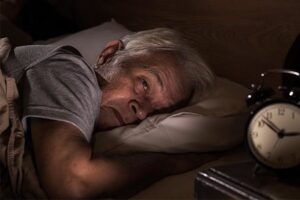Neurology
Insomnia
No Prescription Needed: The Risks of Self-Medication for Insomnia
Overview
Self-medication for insomnia raises a variety of concerns, some of which are related to the pharmacology and side effects of over-the-counter (OTC) sleep aids. Additionally, when self-medicating patients do not discuss their sleep issues with their doctors, other conditions, such as sleep apnea, may go undetected.
Expert Commentary
Stephen M. Stahl, MD, PhD, DSc (Hon)
|
|
“Some of the OTC sleep aids contain active ingredients that are not without risks. Others are promoted as being active or efficacious when, in reality, they are not.”
In this age of wellness and self-empowerment, it is not surprising that people would try to treat symptoms of insomnia without going to the doctor and without getting a prescription. However, it is important to recognize that some of the OTC sleep aids contain active ingredients that are not without risks. Others are promoted as being active or efficacious when, in reality, they are not. While the occasional use of such medications for transient sleeplessness may not result in any difficulties, their chronic use can lead directly and indirectly to short- and long-term health issues.
Patients should be counseled to avoid OTC antihistamines, which are accompanied by anticholinergic and antimuscarinic actions and can cause significant side effects, particularly in older individuals who may be taking prescribed medications that have anticholinergic actions. When you are blocking cholinergic muscarinic receptors, you may be changing memory and alertness, not to mention causing other side effects such as dry mouth, blurred vision, constipation, and urinary retention, among others. Effectiveness over time is also a concern. Taken over long periods of time, these drugs have been linked to a heightened risk of dementia. Further, although antihistamines may cause drowsiness, simply enabling patients to fall asleep is not the only goal of treatment. Sleep maintenance throughout the night is another significant need for many individuals with insomnia. So, for a variety of reasons, the routine use of antihistamines to treat insomnia is not recommended.
With regard to supplements, melatonin is widely used to help induce sleep. A pharmaceutical grade of melatonin is approved for use as a sleep aid in Europe. Melatonin is also used in the United States; however, significant variability of melatonin content has been reported with these products. Melatonin can be useful for certain patients, particularly if it is used in conjunction with exposure to light during the day. Although melatonin seems to be generally well tolerated, it may not be efficacious for the insomnia, depending on the individual.
Yet another risk related to self-treating chronic sleeplessness involves the use of alcohol in combination with other remedies. Alcohol is very much a nonspecific sedating agent, and, when taken with other agents that are normally slightly sedating, there is the potential for far more sedation.
Without being properly evaluated for sleep problems, patients who self-medicate also run the risk of masking underlying conditions, such as sleep apnea and depression, that can further adversely affect their health if not properly treated. Many patients fail to mention sleep problems during otherwise routine doctor visits, so it is important to ask patients about their sleep quality and to make appropriate recommendations for sleep studies and/or pharmacotherapy, when necessary.
References
Andrade C. Anticholinergic drug exposure and the risk of dementia: there is modest evidence for an association but not for causality. J Clin Psychiatry. 2019;80(4):19f13000. doi:10.4088/JCP.19f13000
Erland LAE, Saxena PK. Melatonin natural health products and supplements: presence of serotonin and significant variability of melatonin content. J Clin Sleep Med. 2017;13(2):275-281. doi:10.5664/jcsm.6462
Inkelis SM, Hasler BP, Baker FC. Sleep and alcohol use in women. Alcohol Res. 2020;40(2):13. doi:10.35946/arcr.v40.2.13
Maust DT, Solway E, Clark SJ, Kirch M, Singer DC, Malani P. Prescription and nonprescription sleep product use among older adults in the United States. Am J Geriatr Psychiatry. 2019;27(1):32-41. doi:10.1016/j.jagp.2018.09.004
Risacher SL, McDonald BC, Tallman EF, et al; Alzheimer’s Disease Neuroimaging Initiative. Association between anticholinergic medication use and cognition, brain metabolism, and brain atrophy in cognitively normal older adults. JAMA Neurol. 2016;73(6):721-732. doi:10.1001/jamaneurol.2016.0580
Winkelman JW. Clinical practice. Insomnia disorder. N Engl J Med. 2015;373(15):1437-1444. doi:10.1056/NEJMcp1412740











